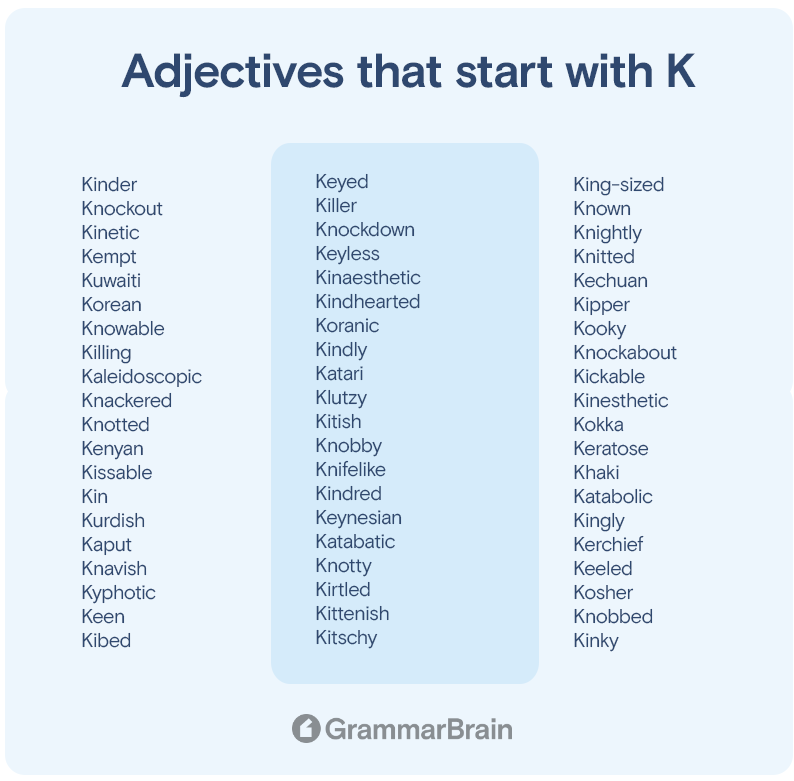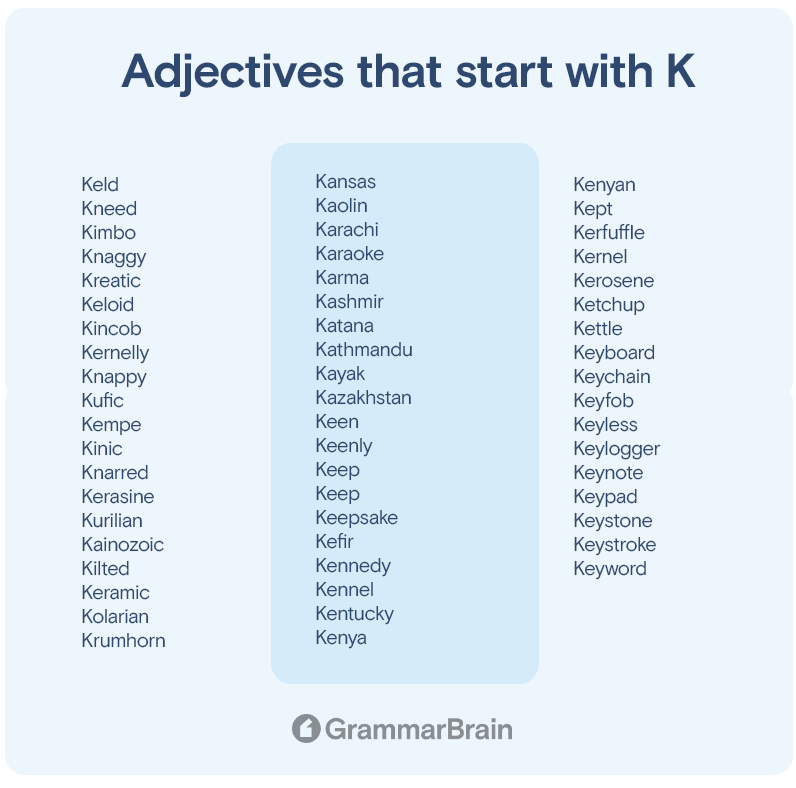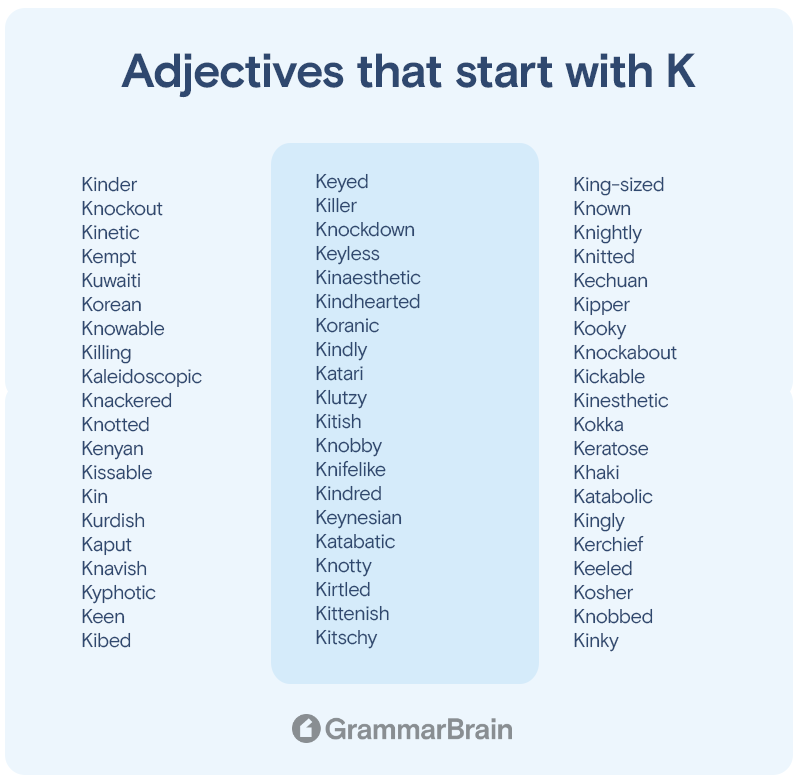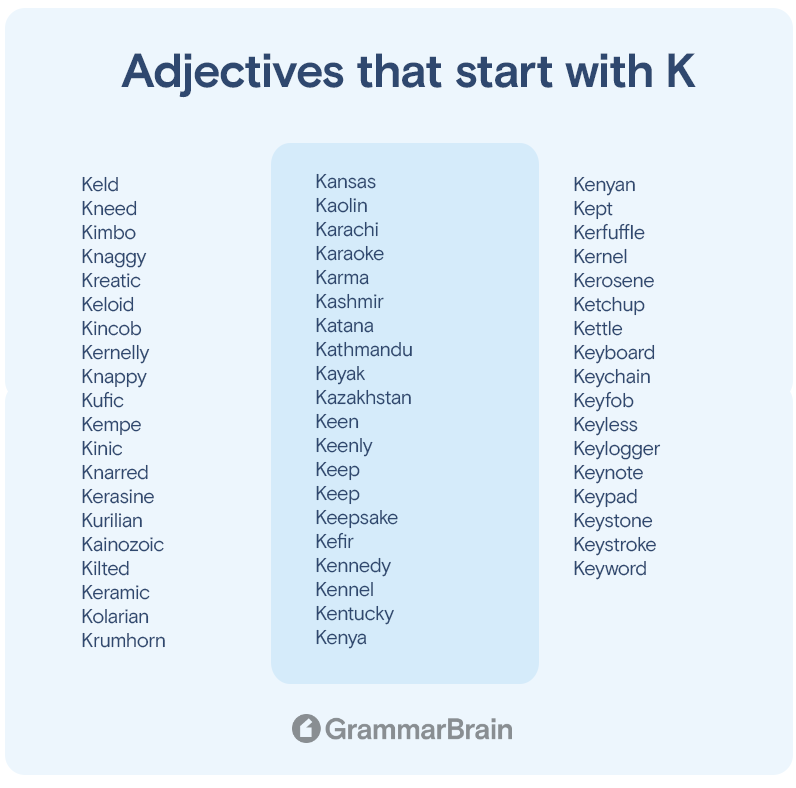Looking for adjectives that start with K? Adjectives are words that describe an object or person. Adjectives are used to describe things such as size, shape, color, and so on. For example, the word “size” describes a person’s body weight. Adjectives can be used to describe objects such as food or clothing. They can also be used to describe people such as a person’s personality or appearance.

List of words that start with the letter K
- Khaki
- Kibbutz
- Kibosh
- Kick
- Kickback
- Kickoff
- Kickstand
- Kickstart
- Kid
- Kiddie
- Kidnap
- Kidnapped
- Kidnapper
- Kidney
- Kiev
- Kill
- Killer
- Kilogram
- Kilohertz
- Kilometer
- Kilometer
- Kilowatt
- Kimberlite
- Kind
- Kinda
- Kindergarten
- Kindly
- Kindness
- Kinetic
- King
- Kingdom
- Kingpin
- Kinship
- Kiosk
- Kiss
- Kitchen
- Kitschy
- Kitten
- Kitty
- Kludge
- Klutzy
- Knack
- Knapsack
- Knee
- Kneel
- Knell
- Knew
- Knife
- Knight
- Knighthood
- Knit
- Knitted
- Knob
- Knock
- Knockoff
- Knockout
- Knot
- Know
- Knowingly
- Knowledge
- Known
- Knuckle
- Koala
- Korea
- Korean
- Koruna
- Kosher
- Kosovo
- Kremlin
- Krona
- Krone
- Kronor
- Kryptonite
- Kudzu
- Kurdish
- Kurgan
- Kuwait
- Keeptomaniac
- Kleptomaniacal
- Klutz
- Klutzy
- Knackered
- Knackish
- Knacky
- Knagged
- Knaggy
- Knarled
- Knavish
- Kneecap
- Kneed
- Knee-deep
- Knee-high
- Knee-jerk
- Knee-length
- Knifelike
- Knightage
- Knightless
- Knightly
- Knitted
- Knobbed
- Knobbly
- Knobby
- Knockabout
- Knockdown

List of adjectives that start with K
Below are 100 adjectives that start with the letter K
- Kinder
- Knockout
- Kinetic
- Kempt
- Kuwaiti
- Korean
- Knowable
- Killing
- Kaleidoscopic
- Knackered
- Knotted
- Kenyan
- Kissable
- Kin
- Kurdish
- Kaput
- Knavish
- Kyphotic
- Keen
- Kibed
- Killable
- Key
- Kashmiri
- Knee-deep
- Kind
- Keyed
- Killer
- Knockdown
- Keyless
- Kinaesthetic
- Kindhearted
- Koranic
- Kindly
- Katari
- Klutzy
- Kitish
- Knobby
- Knifelike
- Kindred
- Keynesian
- Katabatic
- Knotty
- Kirtled
- Kittenish
- Kitschy
- Knowing
- Ketonic
- Kayoed
- King-sized
- Known
- Knightly
- Knitted
- Kechuan
- Kipper
- Kooky
- Knockabout
- Kickable
- Kinesthetic
- Kokka
- Keratose
- Khaki
- Katabolic
- Kingly
- Kerchief
- Keeled
- Kosher
- Knobbed
- Kinky
- Kookie
- Kerned
- Kantian
- Kinglike
- Knobbly
- Kathetal
- Kecklish
- Kiby
- Knacky
- Keld
- Kneed
- Kimbo
- Knaggy
- Kreatic
- Keloid
- Kincob
- Kernelly
- Knappy
- Kufic
- Kempe
- Kinic
- Knarred
- Kerasine
- Kurilian
- Kainozoic
- Kilted
- Keramic
- Kolarian
- Krumhorn
- Kerchiefed
- Kaligenous
- Kenspeckle
- Kabul
- Kale
- Kangaroo
- Kansas
- Kaolin
- Karachi
- Karaoke
- Karma
- Kashmir
- Katana
- Kathmandu
- Kayak
- Kazakhstan
- Keen
- Keenly
- Keep
- Keep
- Keepsake
- Kefir
- Kennedy
- Kennel
- Kentucky
- Kenya
- Kenyan
- Kept
- Kerfuffle
- Kernel
- Kerosene
- Ketchup
- Kettle
- Keyboard
- Keychain
- Keyfob
- Keyless
- Keylogger
- Keynote
- Keypad
- Keystone
- Keystroke
- Keyword
Descriptive adjectives that start with K
Below are 60 descriptive adjectives that start with the letter K
- Kaleidoscopic
- Keeled
- Keen
- Keltic
- Kerned
- Key
- Keyboard
- Keyed
- Kick-ass
- Kiddie
- Kidney
- Kilted
- Kimbo
- Kin
- Kind
- Kindergartner
- Kind-hearted
- Kindless
- Kindly
- Kindness
- Kindred
- Kinematic
- Kinetic
- Kingdomed
- Knightly
- Kingless
- Kingly
- Kingy
- Kipper
- Kittenish
- Knackered
- Knackish
- Knacky
- Kneecap
- Kneed
- Knee-deep
- Knee-high
- Knee-jerk
- Knee-length
- Knightage
- Knightless
- Knobbed
- Knobby
- Knockdown
- Knock-kneed
- Knock-on
- Knotless
- Knotted
- Knotty
- Knowable
- Knowing
- Knowledgeable
- Known
- Knuckled
- Knurled
- Krumhorn
- Kurdish
- Kuwaiti
- Kvetch
- Kyrgyzstani
Positive adjectives that start with K
Below are some positive adjectives that start with the letter K
- Kaleidoscopic
- Keen
- Key
- Kind
- Kindred
- Kind-hearted
- Kindly
- Kingly
- Knightly
- Knowing
- Knowledgeable
- Known
- Kooky
- Kosher
Negative adjectives that start with K
Below are some negative adjectives that start with the letter K
- Kid
- Kiddy
- Killing
- Kindless
- Klutzy
- Knagged
- Knaggy
- Knarled
- Knavish
- Knee-jerk
- Knobby
- Knuckled
Adjectives that start with K to describe a person
Below are 44 adjectives that start with the letter K to describe a person
- Kaput
- Keen
- Kempt
- Kentuckian
- Kenyan
- Kept
- Key
- Kick-ass
- Kid
- Kiddish
- Killer
- Kill-joy
- Kilted
- Kin
- Kind
- Kinder
- Kindergartner
- Kindest
- Kingless
- Kingly
- King-size
- Kinky
- Kissable
- Kissy
- Kittenish
- Kleptomaniac
- Klutz
- Knackered
- Knavish
- Knightly
- Knobby
- Knockout
- Knotty
- Knowable
- Knowledgeable
- Known
- Knucklehead
- Kooky
- Korean
- Kosher
- Kurd
- Kuwaiti
- Kvetch
- Kyrgyzstani
Adjectives that Start with Ka
Below are 15 adjectives that start with Ka
- Kabbalistic
- Kafkaesque
- Kaleidoscopic
- Kaleidoscopical
- Kampuchean
- Kantian
- Kaput
- Karyokinetic
- Kashmiri
- Katabatic
- Katabolic
- Katari
- Katharobic
- Kayoed
- Kazakhstani
Adjectives that Start with Ke
Below are 15 adjectives that start with Ke
- Kechuan
- Keeled
- Keen
- Keltic
- Kempt
- Kentuckian
- Kenyan
- Kept
- Kerned
- Key
- Keyboard
- Keyed
- Keyless
- Keynesian
Adjectives that Start with Kh, Ki
Below are 47 adjectives that start with Kh, Ki
- Khaki
- Kick-ass
- Kid
- Kiddie
- Kiddish
- Kiddy
- Kiddyish
- Kidney
- Killable
- Killer
- Killing
- Kill-joy
- Kilted
- Kimbo
- Kin
- Kinaesthetic
- Kind
- Kinder
- Kindered
- Kindergartner
- Kindest
- Kindhearted
- Kind-hearted
- Kindled
- Kindless
- Kindly
- Kindness
- Kindred
- Kinematic
- Kinesthetic
- Kinetic
- Kingdomed
- Knightly
- Kingless
- Kinglike
- Kingly
- King-size
- King-sized
- Kingy
- Kinky
- Kiplingesque
- Kipper
- Kissable
- Kissy
- Kitchen
- Kitschy
- Kittenish
Adjectives that Start with Kl, Kn
Below are 41 adjectives that start with Kl, Kn
- Kleptomaniac
- Kleptomaniacal
- Klutz
- Klutzy
- Knackered
- Knackish
- Knacky
- Knagged
- Knaggy
- Knarled
- Knavish
- Kneecap
- Kneed
- Knee-deep
- Knee-high
- Knee-jerk
- Knee-length
- Knifelike
- Knightage
- Knightless
- Knightly
- Knitted
- Knobbed
- Knobbly
- Knobby
- Knockabout
- Knockdown
- Knocked-up
- Knock-kneed
- Knock-on
- Knockout
- Knotless
- Knotted
- Knotty
- Knowable
- Knowing
- Knowledgeable
- Known
- Knuckled
- Knucklehead
- Knurled
Adjectives that Start with Ko, Ku, Ky
Below are 15 adjectives that start with Ko, Ku, Ky
- KO’d
- Kokka
- Kookie
- Kooky
- Koranic
- Korean
- Kosher
- Kosheren
- Krumhorn
- Kurd
- Kurdish
- Kuwaiti
- Kvetch
- Kyphotic
- Kyrgyzstani
Example Sentences
- Kind –
Meaning – caring about others- friendly and generous
Sentence – He is a kind person
- Keen –
Meaning – very interested in something- wanting to do something
Sentence – I have a keen interest in mathematics.
- Kissable –
Meaning – Capable of being kissed.
Sentence – That baby is so cute. His cheeks are so kissable.
- Kenyan –
Meaning – relating to Kenya or its people.
Sentence – Kenyan people are so humble.
- Killing –
Meaning – that kills or relates to killing.
Sentence – He had a great killing spree in the game
- Korean –
Meaning – relating to North or South Korea or its people or language.
Sentence – Korean-pop music has some great melodies.
- Kuwaiti –
Meaning – relating to Kuwait or its people.
Sentence – Kuwaiti people have such a great lifestyle.
- Kinetic –
Meaning – of or produced by the movement
Sentence – The kinetic energy of this roller is powerful.
- Knowable –
Meaning – able to be understood, ascertained, or observed
Sentence – The destruction of the building is knowable in advance
- Kurdish –
Meaning – relating to the Kurds or their language.
Sentence – The outfits of Kurdish people are prettier than most.
- Kashmiri –
Meaning – relating to Kashmir, its people, or its language.
Sentence – Kashmiri cuisine is of the best cuisine in India.
- Killer –
Meaning – that kills or relates to killing.
Sentence – The actor always gives a killer look.
- Kneed –
Meaning – to follow or give respect
Sentence – Do not kneed or over-mix this dough unless indicated in the recipe.
- Kept –
Meaning – having the expression of principles, ideas, etc., controlled, dominated, or determined by one whose money provides support
Sentence – He was reputed to have kept a cool head during battle and wasn’t easily intimidated.
- Kiddish –
Meaning – Behaving like a child
Sentence – His behavior is too kiddish
- Kindest –
Meaning – caring about others- friendly and generous
Sentence – You are the kindest, sweetest person I have ever met.
- King-size –
Meaning – bigger than usual
Sentence – We are taking the king-size bed for our home
- Kinky –
Meaning – having kinks or twists
Sentence – Add synthetic hair for a style called kinky twists.
- Kinder – He should be kinder to the people around him.
Meaning – caring about others- friendly and generous
Sentence – Pierre signed the deed, and the princess grew kinder after that.
Adjectives that start with K (images)


Why are adjectives important?
There are several ways to talk about a person, place, or thing. You can talk about them by using adjectives as modifiers or statements.
You can also use adverbs to modify your main clauses when you discuss a person, place, or thing.
Adjectives also help to make sentences more interesting by giving them more detail. For example, if you were writing about a person who was tall and thin. You could describe them as skinny and tall instead of saying they were tall. Adjectives also help to add precision to your writing by providing more information about the subject of your sentence.
Adjectives are also used to describe people’s personalities and appearance. For example, the word “personality” describes someone’s personality. Adjectives can also be used to describe people’s appearance such as their hair color or eye color.
Adjectives can be used to describe a person, place, or thing. For example, “the color of his shirt is orange” would be an adjective describing the color of the shirt. They can also be used to describe an object such as a person’s clothes or a place’s architecture.
Conclusion
In conclusion, Adjectives are essential because they help clarify a sentence’s meaning. Without adjectives, it is difficult for a reader to understand what is being said.
Talking about a person, place, or thing has several ways. You can talk about them by using adjectives as modifiers or statements.
You can also use adverbs to modify your main clauses when you discuss a person, place, or thing.
Adjectives also help to make sentences more interesting by giving them more detail. For example, if you were writing about a person who was tall and thin. You could describe them as skinny and tall instead of saying they were tall. Adjectives also help to add precision to your writing by providing more information about the subject of your sentence.
In this section, we have learned about adjectives starting with the letter K in a sentence. We have also discussed how these adjectives are used to describe various things. As we can see from the examples, adjectives are very important because they help us describe the things we want to know about.
Other adjective lists
Other lists of adjectives:
- Adjectives that start with A
- Adjectives that start with B
- Adjectives that start with C
- Adjectives that start with D
- Adjectives that start with E
- Adjectives that start with F
- Adjectives that start with G
- Adjectives that start with H
- Adjectives that start with I
- Adjectives that start with J
- Adjectives that start with K
- Adjectives that start with L
- Adjectives that start with M
- Adjectives that start with N
- Adjectives that start with O
- Adjectives that start with P
- Adjectives that start with Q
- Adjectives that start with R
- Adjectives that start with S
- Adjectives that start with T
- Adjectives that start with U
- Adjectives that start with V
- Adjectives that start with W
- Adjectives that start with X
- Adjectives that start with Y
- Adjectives that start with Z
Inside this article
Fact checked:
Content is rigorously reviewed by a team of qualified and experienced fact checkers. Fact checkers review articles for factual accuracy, relevance, and timeliness. Learn more.
Core lessons
Glossary
- Abstract Noun
- Accusative Case
- Anecdote
- Antonym
- Active Sentence
- Adverb
- Adjective
- Allegory
- Alliteration
- Adjective Clause
- Adjective Phrase
- Ampersand
- Anastrophe
- Adverbial Clause
- Appositive Phrase
- Clause
- Compound Adjective
- Complex Sentence
- Compound Words
- Compound Predicate
- Common Noun
- Comparative Adjective
- Comparative and Superlative
- Compound Noun
- Compound Subject
- Compound Sentence
- Copular Verb
- Collective Noun
- Colloquialism
- Conciseness
- Consonance
- Conditional
- Concrete Noun
- Conjunction
- Conjugation
- Conditional Sentence
- Comma Splice
- Correlative Conjunction
- Coordinating Conjunction
- Coordinate Adjective
- Cumulative Adjective
- Dative Case
- Determiner
- Declarative Sentence
- Declarative Statement
- Direct Object Pronoun
- Direct Object
- Diction
- Diphthong
- Dangling Modifier
- Demonstrative Pronoun
- Demonstrative Adjective
- Direct Characterization
- Definite Article
- Doublespeak
- False Dilemma Fallacy
- Future Perfect Progressive
- Future Simple
- Future Perfect Continuous
- Future Perfect
- First Conditional
- Irregular Adjective
- Irregular Verb
- Imperative Sentence
- Indefinite Article
- Intransitive Verb
- Introductory Phrase
- Indefinite Pronoun
- Indirect Characterization
- Interrogative Sentence
- Intensive Pronoun
- Inanimate Object
- Indefinite Tense
- Infinitive Phrase
- Interjection
- Intensifier
- Infinitive
- Indicative Mood
- Participle
- Parallelism
- Prepositional Phrase
- Past Simple Tense
- Past Continuous Tense
- Past Perfect Tense
- Past Progressive Tense
- Present Simple Tense
- Present Perfect Tense
- Personal Pronoun
- Personification
- Persuasive Writing
- Parallel Structure
- Phrasal Verb
- Predicate Adjective
- Predicate Nominative
- Phonetic Language
- Plural Noun
- Punctuation
- Punctuation Marks
- Preposition
- Preposition of Place
- Parts of Speech
- Possessive Adjective
- Possessive Determiner
- Possessive Case
- Possessive Noun
- Proper Adjective
- Proper Noun
- Present Participle
- Prefix
- Predicate



